Episodes
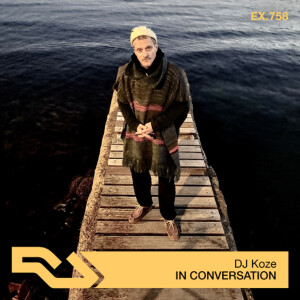
6 days ago
6 days ago
The beloved German producer talks about finding inner peace, overstimulation and his new album on Pampa Records.
Mental health is a topic that comes up frequently in the music industry, but it's still not discussed enough among electronic music's top performers. In this RA Exchange, Stefan Kozalla—better known as DJ Koze—opens up about his battle with anxiety, self-doubt and rising expectations that come with being a long-standing, high-profile name. He talks about overstimulation, music as rest and the compromises artists need to make to have relevance and staying power.
Kozalla, a beloved and eccentric German artist who has developed a cult following over the course of his career, has productions on esteemed labels like XL, Kompakt, Cocoon, Warp, Ninja Tune and BPitch, which garner praise as soon as they're released. "Every time DJ Koze comes out of the woodwork to drop a 12-inch—or even just a remix—we usually end up hearing it everywhere for months on end," wrote former RA editor Andrew Ryce.
Kozalla talks to RA contributor (and former editor) Matt Unicomb about his production process and early influences—an uncanny combination of Basic Channel and Public Enemy—as well as his forthcoming album, Music Can Hear Us, coming out on Pampa Records on April 4th. Listen to the episode in full. -Chloe Lula
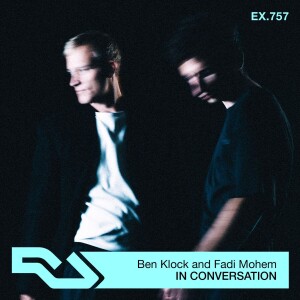
Wednesday Mar 19, 2025
Wednesday Mar 19, 2025
"We wanted to let go of everything we know." The Berghain residents talk about underground values, leaving behind expectations and their collaborative album, LAYER ONE.
Berghain residents and now frequent collaborators Ben Klock and Fadi Mohem have become synonymous with the classic, no frills aesthetic that's come to define the Berlin institution's sound, with one exception: their newest LP, LAYER ONE. The album sees them step away from techno in a listening experience that explores IDM, ambient and experimental electronic music with guest vocal appearances by UK artists Cobey Sey and Flowdan.
In this Exchange, they talk to Chloe Lula about this departure from their typical style, which imagines a post-human world where AI reigns supreme. They also reflect on building generational bridges in the music industry; how their respective ideas of success have changed; underground values and sensibilities; and why the ethos of an earlier era continues to inform their work.
Klock also revisits the decade that's elapsed since his last RA interview, including why he's chosen to return to the studio after years on the road, his unexpected career as a DJ and the key to long-lasting relevance in a scene that doesn't slow down. Listen to the episode in full.
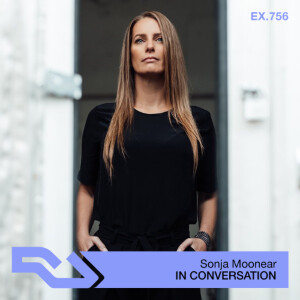
Tuesday Mar 11, 2025
Tuesday Mar 11, 2025
The doyenne of minimal reflects on Perlon, forgotten classics and the tracks that never leave her record bag in this live edition of Playing Favourites at Dimensions Festival.
Following the minimal boom of the '00s and early '10s, the sound has in more recent years flourished quietly in the smaller corners of certain scenes. It certainly, as some people like to claim, never died. In fact, if you were to discuss this with Sonja Moonear, the Swiss DJ would argue that the genre is as popular as ever.
Much like the other artists in the upper echelons of the scene—Zip, Raresh, Nicolas Lutz—Moonear made a name for herself by DJing rather than making music. She cut her teeth in Geneva as a resident at its key club at the time, Weetamix. Perlon label head Zip was a regular guest and, as Moonear recounts, he invited her to play in Berlin after she warmed up for him a few times. Moonear is now an in-demand DJ in her own right, with a style that takes in a broad cross-section of house, techno and minimal.
Recorded at last summer's Dimensions Festival, this edition of Playing Favourites sees Moonear select some of her favourite '90s and early '00s minimal classics and the records that never leave her record bag. She's truly obsessed with music and finding rare grooves, and her enthusiasm shines through. In between playing tracks, she talks about the squat scene in Geneva and how she spends hours preparing her bag every week. She reminisces about the first time she put her hand on a turntable; her transition away from the piano as an adolescent; and her primary goal in her career, which is "purely to enjoy herself."
@moonear
ra.co/exchange/794
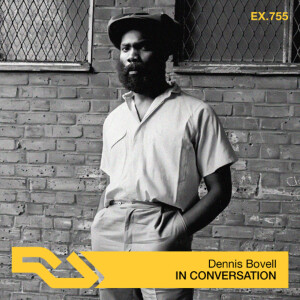
Wednesday Mar 05, 2025
Wednesday Mar 05, 2025
"I wanted to be at the forefront of the beat that would storm the world." The renowned musician talks about how reggae became the sound of resistance in the UK.
How did reggae become the sound of resistance in the UK? In this RA Exchange, the influential Barbados-born guitarist, bass player and record producer Dennis Bovell talks about moving to South London aged 12 and navigating its tense racial and musical landscape. Through the music he wrote and produced, he responded directly to racist rhetoric and colonialist attitudes rocking the UK. After the arrival of the Empire Windrush ship in June 1948—which brought a generation of Caribbean people over to rebuild post-war Britain—the UK experienced new social pressures as the diaspora assimilated to their new lives. But London also became a melting pot of creative and cultural diversity. Reggae became resistance music, and artists like Bovell became bandleaders.
Bovell speaks with writer and musician Tony Nwachukwu about music as social commentary, especially in his reggae band Matumbi, which was intentionally provocative, aiming to challenge the status quo and give voice to the Black British experience through its lyrics, themes and messaging. Matumbi was critical in developing the British reggae sound, and Bovell went on to record other musical projects that were key in shaping the early days of reggae, dub and lover's rock.
He also reflects on his time engineering for artists in different scenes, like the German electronic duo Saâda Bonaire, the Japanese band Yellow Magic Orchestra and Ryuichi Sakamoto. Bovell's unique ability to bring together different musical styles at the peripheries of dub made him a highly sought-after collaborator with a knack for navigating delicate dynamics in the industry, especially for Black artists. Listen to the episode in full. -Chloe Lula

Wednesday Feb 26, 2025
Wednesday Feb 26, 2025
"It starts within yourself." The DJ, vocalist and producer talks about self-improvement, moving to rural Portugal and working alongside long-time partner Steffi.
There may be no voice as rich, vibrant or easily distinguishable in today's house and techno scene than that of Virginia. The Brazilian-German DJ, producer and singer has earned a name for herself as a hybrid house vocalist and a resident at Panorama Bar, where she plays sets featuring her own live vocals. Born in Munich to a family of musicians, she became enamoured with the soulful singing of artists like Sade, Whitney Houston and Tracy Chapman, who became her early guiding lights. It wasn't until her adolescence, when her sister took her to a nightclub, that it crossed her mind to begin blending these two musical worlds. By the mid-2010s, Virginia had relocated to Berlin to earnestly pursue a career in electronic music and create a new, house-focused musical vocabulary that's become completely her own.
It was around this time that Virginia met her long-time partner, fellow DJ and producer Steffi. In this week's Exchange, she speaks with Chloe Lula about their personal and creative relationship, and their love of collaborating together in the studio and behind the decks. After more than two decades in Berlin, the couple relocated to rural Portugal in 2020, a move that's opened up a world of abundant rest and opportunity. They opened up a studio and residency called Candy Mountain (so called for its veritable candy shop of synthesizers and hardware), where they've found a new appreciation for taking things slow: going on walks in the countryside, engaging in botany and inviting friends and collaborators over to work on music. She reflects on what it means to step away from the demands of Berlin's bustling music industry and why her voice has remained such a powerful source of energy and inspiration over the course of her career, and her forthcoming album with Steffi on Dekmantel, Patterns of Vibration. Listen to the episode in full. -Chloe Lula
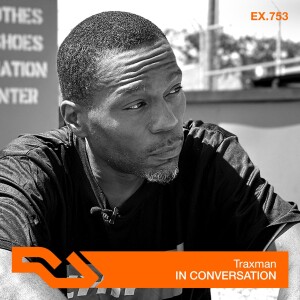
Wednesday Feb 19, 2025
Wednesday Feb 19, 2025
Anyone with a passing interest in footwork and juke will know of Traxman. Corky Strong has a long history in the world of Chicago dance music, first releasing on the legendary Dance Mania label—which is now celebrating 40 years—in the mid-'90s. He's since split his productions between ghetto house, juke and footwork, releasing alongside titans of Black American music like the late DJ Deeon and DJ Rashad. Strong went on to become a member of DJ Rashad's renowned Teklife crew, and he was one of the creators of the legendary mixtapes on coloured cassettes that became a prototype for juke and footwork's evolution.
In this Exchange, Strong speaks with RA's Kiana Mickles in New York about how he first became introduced to this world through his cousins, with whom he'd listen to funk and slow jams, Parliament Funkadelic, Farley Jackmaster Funk, James Brown and a variety of hip-hop throughout the '80s. The pieces eventually fell into place, he recounts, when he met the "mysterious kid" DJ Rashad in 1997. Together, they helped shape the music scene in Chicago, and the rest, as they say, is history.
Over the last few years, Strong has been celebrating footwork's past by putting out a series of albums called Da Mind of Traxman on Planet Mu. He's just released his third volume, and his first since 2014, which was crafted with the help of fellow Planet Mu artist Sinjin Hawke. Strong took on A&R duties to collate the best from hundreds of tracks dating back to 2005. The series is notable in part because it's a catalogue of footwork and its Chicago lineage—juke and house—as well as these genres' soul, funk and rock roots.
Strong talks to Mickles about what Chicago's music scene was like in the '80s and '90s, why footwork was so rooted in dancing and where the genre is heading in the future. Listen to the episode in full. -Chloe Lula
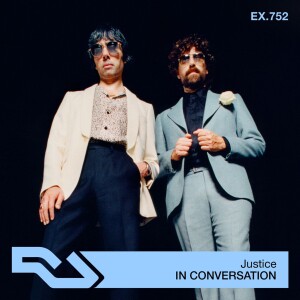
Wednesday Feb 12, 2025
Wednesday Feb 12, 2025
The famed electro house duo open up about their 2024 album and the challenges of touring live.
In the mid-'00s, songs like "D.A.N.C.E." and "We Are Your Friends" emerged as stadium-sized anthems during a new wave of electro house that weaved in elements of rock and disco. The architects behind these hits were Parisian duo Justice, AKA Gaspard Augé and Xavier de Rosnay. Together with their Ed Banger contemporaries, they rode a craze that took over airwaves and dance floors, alongside peers like label founder Busy P and the late DJ Mehdi. Their first album, Cross, quickly became a classic, helping to establish Ed Banger as the flagbearer for French electro. Justice went on to tour a dynamic live show with spectacular lights and visuals, and later released two more albums before taking an eight-year hiatus and largely disappearing from the spotlight.
Last year, Augé and de Rosnay returned with their fourth studio album, Hyperdrama, which features a GRAMMY-winning collaboration with Tame Impala. Referencing indie rock and early '90s hardcore techno, the LP sparked a revived interest in the duo—if you watched last year's Olympics in Paris, 18 minutes of their music featured in the closing ceremony.
In this RA Exchange, Augé and de Rosnay talk to Resident Advisor's editor, Gabriel Szatan, about being back on the road and balancing touring with family life, a rhythm that hasn't felt natural to them after so much time off. They open up about dealing with technical issues and making mistakes when performing, despite having played countless iterations of their live shows. The conversation also touches on their earliest influences—like gaming culture and bands including the White Stripes, and how they've cultivated such a dedicated international fanbase. This episode was recorded over the course of multiple backstage conversations. Listen to the episode in full. -Chloe Lula
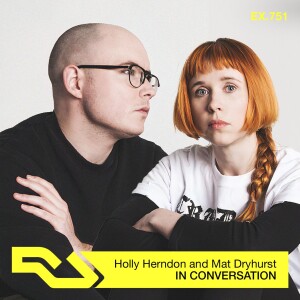
Wednesday Feb 05, 2025
Wednesday Feb 05, 2025
"We're pro-AI and we're pro-consent. Those things don't have to be mutually exclusive." The activists and artists talk about the hot button issues facing AI's governance.
The world is deep in the throes of a heightening debate over AI. Just this week, the Vatican published an essay addressing the potential, and risks, of AI in a new high-tech world as well as its intersection with religion and humanity. In politics, figures like Elon Musk are advising citizens that the US government will become increasingly "AI-first," using data about its individuals to make federal decisions. And in the world of culture and the humanities, the alarm has been sounded on AI's ability to both aid in creativity and homogenise the art and music being produced and consumed, raising concerns that much of what's being released is sounding increasingly the same.
There are probably no better experts on this far-ranging topic than Holly Herndon and Mat Dryhurst, two Berlin-based academics and artists who have entrenched themselves in the world of AI ethics, advocacy and art for the past two decades. Now married, they come from DIY punk backgrounds, both having lived in the Bay Area pre-tech bubble while Herndon completed a Ph.D in Computer Music at Stanford. Their work is primarily concerned with how AI is governed as it becomes more ubiquitous in our everyday lives, and what its implications are for ownership of AI-generated artworks.
In this urgent and timely RA Exchange, the duo talk about their shift closer to the art world following their 2024 exhibition at The Whitney Biennial and their most recent show at Serpentine Gallery in London, The Call, which will close at the end of this month. It's one of many forward-thinking projects they've worked on to move away from the fear narrative dominating dialogue around how AI is influencing art and music, instead showcasing how machine learning can be used to push art forward. They also address their view of socialist democratic values with the rise of the far right, raising a young child and doing work that sits squarely between activism and art. Listen to the episode in full. – Chloe Lula

Wednesday Jan 29, 2025
Wednesday Jan 29, 2025
"If a record is falling apart at the seams, I'll probably like it." Recorded live at Houghton 2024, our latest Playing Favourites episode sees the London artist discussing the beautiful leftfield music that's soundtracked his life.
British DJ and producer Call Super brings some colour to the depths of winter with this week's RA Exchange. The multifaceted artist has released music on Houndstooth, Hessle Audio, fabric, Dekmantel and the label he co-runs with Parris, can you feel the sun, becoming known for a deep yet always party-ready sound that combines house, UK funky, tech house and plenty more besides.
In this interview, recorded at last year's Houghton Festival, he talks to RA's managing editor, Carlos Hawthorn, as part of our flagship live series, Playing Favourites. Among his choices are the music he listened to as a child; the record that inspired his passion for DJing; an artist who changed his perspective on music at large; and more practical songs he deploys in sets to refresh a crowd. The territory he covers is huge, from tech house and acid house to contemporary classical, experimental leftfield, abstract percussion and choral music. There are some tracks, he claims, that only work in certain contexts, but if played at the right time, "they send people." Listen to the episode in full. – Chloe Lula
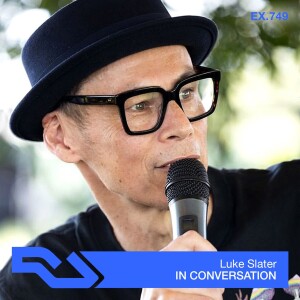
Wednesday Jan 22, 2025
Wednesday Jan 22, 2025
"I'm like a collector—everything I come across makes it into my music." The dance music don talks about the music that shaped him and his recent L.B. Dub Corp album on Dekmantel.
Luke Slater, the British DJ, producer and occasional drummer, has been making music under a slew of monikers since the '80s: Planetary Assault Systems, L.B. Dub Corp, LSD, The 7th Plain, Clementine—the list goes on. While he's put out an excellent range of dynamic analogue music that runs the gamut of house, acid, breakbeat, electro and even spoken word, he's probably best known for his productions and live shows that focus on sleek and solid techno, as showcased on Ostgut Ton and his own imprint, Mote-Evolver.
In the latest instalment of our flagship live series Playing Favourites, Slater unpacks the tracks that, for him, best illustrate the history of techno at large, as well as the records that define his creative process and career trajectory. He speaks with Chloe Lula live from Polifonic festival about his love of Detroit and Underground Resistance, as well as the abiding influence of hip-hop on his early work and his love of intentionally integrating mistakes in his music. He also reflects on how he became the first non-German artist to release on Berghain's esteemed record label, as well as discussing his most recent release, Saturn to Home, for Dekmantel. The double LP saw him return to his drumming practice and introduce surprising and powerful collaborations from electronic music contemporaries and vocalists like Kittin and the poet Benjamin Zephaniah. Listen to the episode in full.
